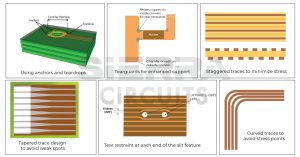Environmental Concerns in Rigid Flex PCB Manufacturing
Rigid flex PCBs combine the rigid and flexible components of traditional printed circuit boards, providing benefits that include reduced weight and size, improved assembly flexibility, higher-density trace routing, and the ability to accommodate multiple environmental conditions. These advantages make them ideal for a wide range of applications, including those in high-vibration environments. Vibration creates mechanical stress that can impact circuit board integrity.
These stresses can cause material fatigue and interconnect reliability issues, unless specific design and manufacturing considerations are taken into account. Fortunately, these concerns can be addressed with careful design and fab processes that take into account the unique challenges of a rigid flex pcb manufacturer in a vibratory environment.

One way to address these challenges is to ensure that the layered structures are properly assembled and sealed. Another is to incorporate the use of blind and buried vias to connect the rigid and flex sections of the circuit board. These allow for higher-density connections and can increase the stability of the circuit.
How to Address Environmental Concerns in Rigid Flex PCB Manufacturing
It is also important to prevent moisture absorption during the assembly reflow process, as it can cause delamination of the polyimide layers in a flex PCB. This can occur due to the high temperatures involved in the reflow process, which causes absorption of the moisture into steam that can expand and delaminate the layers. To avoid this issue, a pre-baking process can be used to ensure that the flex PCB is 100% moisture-free.
Choosing the right manufacturer to produce your rigid flex PCBs is also critical. An experienced and reputable manufacturer will be able to provide you with the quality, consistency, and reliability that your device requires. This can ensure that your device will meet or exceed all necessary industry standards and requirements, resulting in optimal patient outcomes and customer satisfaction.
In addition, a quality rigid flex PCB manufacturer will be able to address any environmental concerns that may affect your product. For example, if your device will be exposed to harsh environments like high-temperatures and humidity, a manufacturer that has the right equipment can help you address these concerns by providing proper heat and humidity control during fabrication. Additionally, if your product will be stored in warehouses or other types of storage areas, a reliable manufacturer will be able to protect your rigid flex PCBs from pests by using appropriate storage techniques and materials.
A reputable rigid flex PCB manufacturer will have the expertise and experience to produce your products quickly and cost-effectively, as well as the track record to back it up. When you are ready to start designing your next project, consider working with a manufacturer that is trusted by the world’s leading medical device companies. This can ensure that your rigid flex PCBs will be produced to the highest standards, so you can trust them to provide you with reliable performance and high-quality components for your advanced medical devices. To learn more about choosing the right manufacturer for your project, contact a supplier today to request a quote.